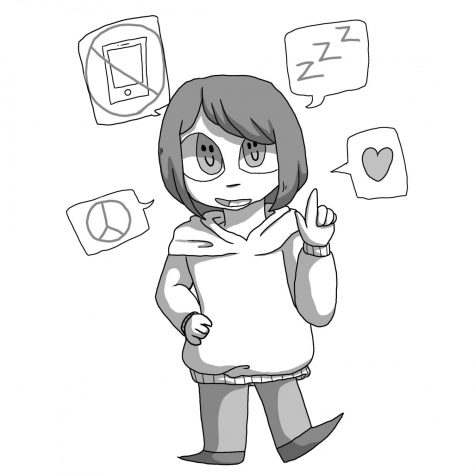How to become a happier version of yourself
April 26, 2019
Self-care can help teens reduce stress, build confidence.
You cannot pour from an empty cup.
This is Psychology Today’s way of explaining the importance of self-care and self-confidence.
According to Psychology Today, “Confidence in one’s value as a human being is a precious psychological resource” and generally a positive factor in life; for teens it is associated with intelligence, income, and their athletic achievement.
Having low self-esteem can lead people to become depressed, to fall short of their potential, or to tolerate abusive situations and relationships.
There are two kinds of confidence, the first kind being the confidence that comes from never being burned, never falling down or experiencing a negative incident.
The second kind of confidence comes from having been in situations where it all went wrong, and kids learned to be resourceful and to problem solve.
Ideally, teens have the second kind of confidence. There are ways to build confidence though, one being self-care.
Self-care is a broad topic that includes both physical and mental health; self-care means bringing balance to both inner and outer worlds.
It can often be neglected by teens, and when teens neglect self-care, other areas of their lives are also neglected.
For example, if your room is messy and unorganized, you may feel unmotivated, stressed and anxious.
There are ways to practice self-care, some examples being getting the sleep you need!
It’s difficult to function when you’re exhausted.
Start small by scheduling a few minutes to an activity you enjoy, such as music, reading, playing a sport, etc.
There are several apps that focus on mindfulness and relaxation that can be scheduled on your phone to remind you to take care of yourself.
Teens experience a lot of stress as it is, and the stress of finding time in your busy schedule to take care of yourself can add on to it. But, start small.
Turn daily activities like walking home or driving to school, into self-care time by adding music, meditation, or mindfulness.
More ways to help build and strengthen confidence are to identify your strengths and skills.
Find things you know you’re good at and praise yourself for them.
Identify others who add value to your life; spend time with others who enjoy who you are and enjoy spending time with you.
The way you see yourself and feel about yourself can be greatly impacted by the way others perceive you and how you see them.
One of the largest factors in this is social media.

Social media allows you to choose what other see.
Rarely do you post pictures without filters, or post about the non-glamourous aspects of like, like cleaning or other boring things you may do.
It is important to see things for what they are—social media is typically the way you want others to see you—not always your true reality.
Cutting back on social media may be a good way to help build self-confidence, but if you decide you’d rather keep your social media, focus on posting things that are true and remember everything isn’t as it seems.
Other tips from school psychologist Tara White:
Understand doing your best is good enough and that no one is perfect.
Plan your activities and deadlines and leave some extra time in your schedule just for you, or for unexpected events.
Eat a balanced diet. Your body needs fuel and lots of it when things are stressful. Carry snacks like protein and energy bars with you.
It is ok to say ‘no.’ Sometimes we feel like we have to do certain things and over plan and over-schedule. Listen to your body and know your limits!
Take things one step at a time when facing difficult situations, and celebrate small successes.